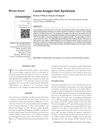 January 2023 in “Skin appendage disorders”
January 2023 in “Skin appendage disorders” A woman's hair grew back after treatment for a rare hair loss caused by proton therapy.
 85 citations,
April 2007 in “Dermatologic Clinics”
85 citations,
April 2007 in “Dermatologic Clinics” Some drugs can cause hair loss, change hair color and shape, or increase hair growth, and treatment may involve stopping the drug or using specific hair growth treatments.
 16 citations,
May 2013 in “Australasian Journal of Dermatology”
16 citations,
May 2013 in “Australasian Journal of Dermatology” Hair loss in Cronkhite-Canada syndrome is reversible by treating the gut issues and doesn't need steroid treatment for the hair itself.
 18 citations,
March 2016 in “Cosmetics”
18 citations,
March 2016 in “Cosmetics” Telogen Effluvium is a condition causing excessive hair loss due to stress, illness, drugs, or hormonal changes, and can be treated with specific products or naturally resolves after 3-4 years.
 1 citations,
February 2013 in “Clinical pediatrics”
1 citations,
February 2013 in “Clinical pediatrics” The baby’s hair loss was due to a rare genetic condition, not treatable by usual methods.
 81 citations,
July 2011 in “Lasers in Medical Science”
81 citations,
July 2011 in “Lasers in Medical Science” The Lexington LaserComb helped regrow hair in mice with a condition similar to human hair loss.
 19 citations,
January 2016 in “Dermatology Research and Practice”
19 citations,
January 2016 in “Dermatology Research and Practice” The study concluded that hair loss in Indian women is not significantly linked to anemia or thyroid problems, but checking thyroid function could help those with ongoing hair loss.
 234 citations,
December 1996 in “Journal of The American Academy of Dermatology”
234 citations,
December 1996 in “Journal of The American Academy of Dermatology” Middle-aged women with chronic telogen effluvium experience increased hair shedding but usually don't get significantly thinner hair.
 February 2024 in “ACS Omega”
February 2024 in “ACS Omega” The Shen Bai Hair Growing Decoction may help treat hair loss by promoting hair growth and reducing inflammation.
 13 citations,
February 2015 in “Actas Dermo-Sifiliográficas”
13 citations,
February 2015 in “Actas Dermo-Sifiliográficas” The document concludes that recognizing specific histological features of different nonscarring alopecias is crucial for accurate diagnosis and understanding hair loss progression.
 30 citations,
October 2013 in “Lupus”
30 citations,
October 2013 in “Lupus” Hair loss in lupus is different from hair loss in alopecia areata and may indicate lupus activity.
 30 citations,
August 1983 in “Pediatric Clinics of North America”
30 citations,
August 1983 in “Pediatric Clinics of North America” Most hair loss in children is caused by a few common conditions, and it's important to diagnose these properly and support the child's mental health.
 39 citations,
October 2018 in “Lupus Science & Medicine”
39 citations,
October 2018 in “Lupus Science & Medicine” Different types of hair loss in lupus need careful diagnosis for proper treatment.
 40 citations,
May 2020 in “Cureus”
40 citations,
May 2020 in “Cureus” The conclusion is that treatments for Telogen Effluvium exist, but standard treatment guidelines are needed.
 April 2024 in “International journal of research in dermatology”
April 2024 in “International journal of research in dermatology” Azathioprine can cause hair loss and matted hair.
 33 citations,
March 2006 in “Seminars in cutaneous medicine and surgery”
33 citations,
March 2006 in “Seminars in cutaneous medicine and surgery” The document explains how to identify different hair problems using a microscope.
 3 citations,
March 2014 in “Turkderm”
3 citations,
March 2014 in “Turkderm” Hair loss in men can be slowed or reversed with treatments like minoxidil and finasteride, but it resumes if treatment stops. It may also indicate early heart disease and obesity.
 19 citations,
May 2012 in “The journal of investigative dermatology/Journal of investigative dermatology”
19 citations,
May 2012 in “The journal of investigative dermatology/Journal of investigative dermatology” The type 3 IP3 receptor is important for controlling hair loss and growth.
 40 citations,
August 2006 in “Current Drug Safety”
40 citations,
August 2006 in “Current Drug Safety” Some drugs can cause hair loss, excessive growth, or color changes, often reversible but sometimes permanent.
 1 citations,
May 2016 in “Current Opinion in Pediatrics”
1 citations,
May 2016 in “Current Opinion in Pediatrics” Children's hair loss can be caused by various factors and should be treated with appropriate, age-specific methods and psychological support.
 May 2008 in “Hair transplant forum international”
May 2008 in “Hair transplant forum international” A genetic test can identify people at risk of male pattern baldness early, allowing for quicker treatment.
 8 citations,
January 2020 in “Skin Pharmacology and Physiology”
8 citations,
January 2020 in “Skin Pharmacology and Physiology” Caffeine improves hair growth, thickness, and reduces shedding.
 4 citations,
October 2018 in “Experimental Dermatology”
4 citations,
October 2018 in “Experimental Dermatology” Dermoscopy shows that diffuse alopecia areata progresses through specific hair growth stages.
 5 citations,
June 2015 in “Journal of dermatology”
5 citations,
June 2015 in “Journal of dermatology” A woman and her daughter had thallium poisoning from a herbal drink and rodenticide, causing hair loss and other symptoms.
 63 citations,
March 1995 in “International Journal of Dermatology”
63 citations,
March 1995 in “International Journal of Dermatology” Some drugs can cause hair loss, and stopping these drugs often leads to hair regrowth.
 11 citations,
March 2001 in “Clinics in Dermatology”
11 citations,
March 2001 in “Clinics in Dermatology” Hair microscopy is useful for diagnosing hair disorders, but clear definitions are needed for accurate genetic analysis.
 40 citations,
January 2010 in “International Journal of Trichology”
40 citations,
January 2010 in “International Journal of Trichology” Loose Anagen Syndrome is a hair condition where hairs can be easily pulled out, mainly affecting young girls, and may improve on its own or with treatment.
 4 citations,
November 2009 in “Medical Clinics of North America”
4 citations,
November 2009 in “Medical Clinics of North America” Stress, nutritional issues, and chronic diseases can cause hair loss, and nail changes may signal internal diseases; treatment focuses on the underlying cause.
 January 2024 in “Skin appendage disorders”
January 2024 in “Skin appendage disorders” Using growth factors and microneedling shows promise for hair regrowth in Alopecia Areata, but more research is needed.
 5 citations,
November 2021 in “Skin appendage disorders”
5 citations,
November 2021 in “Skin appendage disorders” Hair loss can cause stress and mental health issues, so treatments should address both the physical and psychological aspects, involving a team of dermatologists, psychologists, and hair specialists.






























